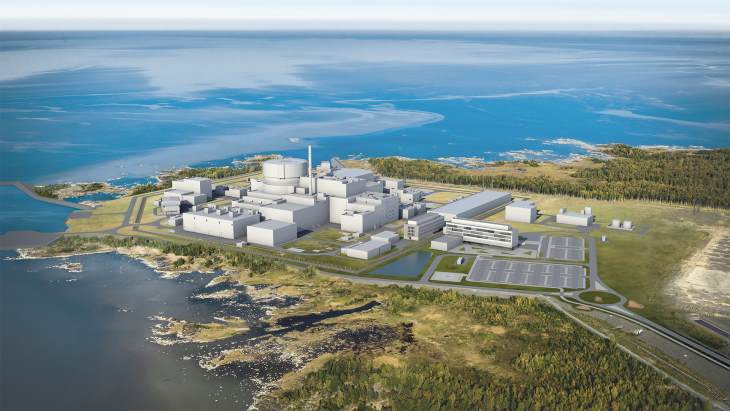Hanhikivi contract repeal unlawful, rules Dispute Review Board
Fennovoima's decision to terminate the engineering, procurement and construction (EPC) contract with Rosatom for the Hanhikivi 1 nuclear power plant at Pyhäjoki in northern Finland was unlawful, the Dispute Review Board has determined.

A rendering of how the Hanhikivi 1 plant could have looked (Image: Fennovoima)
Fennovoima signed the plant supply contract for Hanhikivi with Rusatom Overseas - Rosatom's nuclear power plant exports subsidiary - in December 2013. Rosatom offered to build a plant using a 1200 MWe AES-2006 VVER under a fixed-price contract. The Hanhikivi project is owned by Fennovoima, majority owned (66%) by Voimaosakeyhtiö SF, a Finnish company with shareholders including major Finnish corporations and several local energy companies. The remaining 34% is held by RAOS Voima Oy, the Finnish subsidiary set up in 2014 by Rosatom for the purpose of buying a share in the company.
However, on 2 May this year Fennovoima announced its decision to terminate the engineering, procurement and construction (EPC) contract "due to RAOS Project's significant delays and inability to deliver the project". On 24 May it withdrew its construction licence application for the planned plant.
On 6 May, RAOS Project said it had "no other choice but to defend ourselves and demand compensation" for the "unlawful termination" of the Hanhikivi 1 project. It added that it is ready to discuss "possible options for the project to recommence when conditions permit".
In August, Fennovoima and Rosatom initiated proceedings against each other to claim compensation for damages arising from the termination of the planned Hanhikivi 1 project. At the time, Fennovoima said its claims totaled almost EUR2 billion (USD2 billion), while Rosatom said it was seeking USD3 billion from Fennovoima.
A Dispute Board is a standing body composed of one or three members. Typically set up upon the signature or commencement of performance of a mid- or long-term contract, they are used to help parties avoid or overcome any disagreements or disputes that arise during the implementation of the contract. Dispute Review Boards (DRB) issue recommendations that are not immediately binding on the parties but become so if no party objects within 30 days.
The mechanism of referring to the DRB is provided for in the contract between Fennovoima and RAOS Project and the working procedure of the DRB as an independent expert body is determined by the rules of the International Chamber of Commerce.
"In its findings, the DRB confirmed that Fennovoima had unlawfully terminated the EPC contract for the construction of the Hanhikivi 1 plant, and thereafter unlawfully purported to reject the works performed by RAOS Project Oy as the supplier under the EPC contract," Rosatom said.
The DRB also found that Fennovoima's termination of the Hanhikivi 1 project was in breach of the EPC contract, which gives RAOS Project Oy the right to claim damages from Fennovoima, Rosatom said. Damages will be determined in additional proceedings, it noted.
"The DRB findings made by a panel of renowned international experts express a balanced and objective position in relation to Hanhikivi 1," Rosatom said, adding that it "intends to defend its interests until its demands are fully satisfied".
Fennovoima said: "At the time Fennovoima terminated the contract – eight years into the project – the project had still not even proceeded from the design phase to the construction phase and had accrued delays, at a minimum, of almost a decade."
It noted that the DRB's recommendation is "neither final, nor binding, as both Parties submitted notices of dissatisfaction shortly after it was issued".
Fennovoima said it has since initiated international arbitration proceedings against RAOS Project to recover the amounts to which it is entitled following its termination of the EPC contract.
Researched and written by World Nuclear News
- China Institute of Atomic Energy
- Nuclear Power Institute of China
- Southwestern Institute of Physics
- China Nuclear Power Operation Technology Corporation, Ltd.
- China Nuclear Power Engineering Co., Ltd.
- China Institute for Radiation Protection
- Beijing Research Institute of Uranium Geology (BRIUG)
- China Institute of Nuclear Industry Strategy (CINIS)
- China Nuclear Mining Science and Technology Corporation


